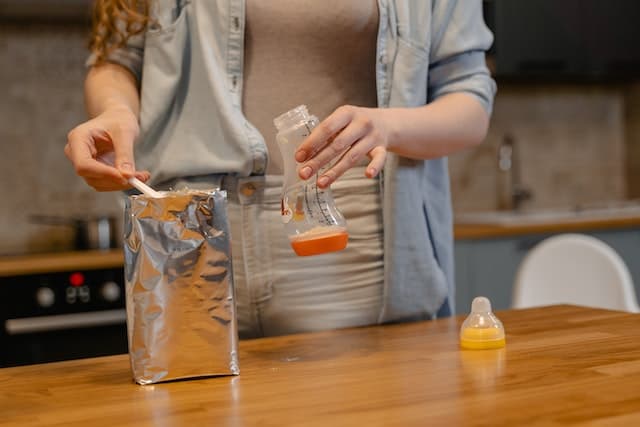When it comes to feeding your baby, there are a variety of options available. While some mothers choose to breastfeed exclusively, others opt for formula feeding. While formula is a great alternative to breast milk, many parents wonder how long it takes for their baby to adjust to this new type of feeding.
Understanding baby formula is an important first step in answering this question. Formula is made up of a variety of ingredients, including proteins, fats, and carbohydrates, that are designed to mimic the nutritional composition of breast milk.
While formula can be a great option for parents who are unable or choose not to breastfeed, it can take some time for babies to adjust to this new type of feeding.
Switching from breast milk to formula can be a challenging transition for some babies. While some babies may take to formula right away, others may experience discomfort or difficulty adjusting to this new type of feeding.
Signs of discomfort or allergies can include fussiness, gas, and diarrhea. In this article, we will explore how long it takes for babies to adjust to formula and provide tips for making this transition as smooth as possible.
Key Takeaways
- Formula is designed to mimic the nutritional composition of breast milk but it can take some time for babies to adjust to this new type of feeding.
- Switching from breast milk to formula can be a challenging transition for some babies and may cause discomfort or allergies.
- If you have concerns about your baby’s adjustment to formula, it is important to consult with a pediatrician.
Understanding Baby Formula
Baby formula, also known as infant formula, is a type of food specially designed for infants who are not breastfeeding or receiving breast milk. It is formulated to provide the necessary nutrients for a baby’s growth and development.
Formula comes in various forms, including powder, liquid concentrate, and ready-to-feed. Powdered formula is the most common type and is usually the most economical. Liquid concentrate is a bit more expensive, but it is more convenient to prepare than powdered formula. Ready-to-feed formula is the most expensive but requires no preparation.
Most formulas are milk-based and fortified with iron. However, some babies may have an allergy or intolerance to cow’s milk protein, in which case a hypoallergenic formula may be necessary. Soy-based formula is an alternative for babies who cannot tolerate milk-based formulas.
There are several specialized formulas available on the market as well, including organic formulas and formulas for babies with specific medical conditions.
For example, Enfamil Enspire Infant Formula is a popular option that is designed to mimic breast milk and contains both lactoferrin and MFGM, two components found in breast milk that are believed to support cognitive development.
It is important to carefully read the ingredients label when selecting a formula for your baby and to consult with a healthcare provider if you have any concerns.
Additionally, it may take some time for a baby to adjust to a new formula, so it is recommended to introduce it gradually over the course of several days.
Related post: I Ran Out Of Baby Formula What Can I Use?
Switching from Breast Milk to Formula
When a baby is born, they rely on breast milk for their nutritional needs. However, there may be situations where a mother is unable to breastfeed, or chooses to switch to formula for personal reasons.
Switching from breast milk to formula can be a challenging transition for both the baby and the mother.
One of the first steps in switching from breast milk to formula is introducing the bottle. It is important to choose a bottle that is designed for formula feeding, and to select a nipple that is appropriate for the baby’s age.
Slow-flow nipples are recommended for newborns, as they allow the baby to control the flow of milk and reduce the risk of choking.
When introducing the bottle, it is important to use a paced bottle feeding technique. This involves holding the bottle in a horizontal position and allowing the baby to take breaks during the feeding. This will help the baby to develop a natural feeding rhythm and prevent overfeeding.
Another important factor when switching from breast milk to formula is ensuring that the baby is latching onto the bottle correctly.
This can be challenging for some babies, as they may be used to a different feeding technique. It may be helpful to try different bottle positions and nipple shapes to find what works best for the baby.
For mothers who are returning to work, it may be necessary to pump breast milk in order to maintain their milk supply. It is important to establish a pumping routine and to use a breast pump that is comfortable and efficient. This will help to ensure that the baby is receiving adequate nutrition while the mother is away.
Finally, it is important to remember that weaning from breastfeeding is a gradual process. It may take several weeks or even months to fully transition to formula feeding. It is important to be patient and to monitor the baby’s weight gain and overall health during this time.
Adjusting to New Formula
When switching baby formula, it is common for babies to experience some discomfort as they adjust to the new formula. The adjustment period can vary depending on the baby and the new formula being introduced. However, most babies will adjust within a week or two.
To help ease the transition, it is recommended to gradually introduce the new formula by mixing it with the old formula. Start by mixing 25% of the new formula with 75% of the old formula for a few days.
Then, gradually increase the amount of new formula while decreasing the old formula until the baby is fully transitioned to the new formula.
During the adjustment period, it is important to monitor the baby for any signs of discomfort or allergic reactions. These may include fussiness, gas, diarrhea, vomiting, or rashes. If any of these symptoms persist or worsen, it is important to consult a healthcare provider.
It is also important to note that some babies may not tolerate certain types of formula due to allergies or sensitivities. In these cases, it may be necessary to try a different type of formula or consult with a healthcare provider for further guidance.
In summary, adjusting to a new formula can take some time, but with a gradual transition and close monitoring, most babies will adjust within a week or two. If any concerns arise, it is important to consult with a healthcare provider.
Signs of Discomfort and Allergies
When switching to formula, it is common for babies to experience some discomfort and allergies. It is important for parents to be aware of the signs and symptoms of discomfort and allergies in their babies.
Some common signs of discomfort in babies include fussiness, crying, spitting up, and changes in stool patterns. Babies may also experience gas and an upset stomach. These symptoms can be caused by a variety of factors, including an intolerance to the protein in cow’s milk or lactose sensitivity.
Allergies to formula can also cause discomfort in babies. Symptoms of an allergic reaction may include vomiting, diarrhea, and skin rashes. In severe cases, babies may experience difficulty breathing and require immediate medical attention.
If a baby shows signs of discomfort or an allergic reaction, it is important to consult a pediatrician. The pediatrician may recommend switching to a different formula or conducting allergy testing to identify the source of the problem.
Parents should also be aware of the potential for colic in their babies. Colic is a condition characterized by excessive crying and fussiness in infants. While the cause of colic is not fully understood, it is believed to be related to digestive issues.
In summary, parents should be vigilant for signs of discomfort and allergies in their babies when transitioning to formula. By being aware of these symptoms, parents can take action to address any issues and ensure their baby’s health and well-being.
Consulting a Pediatrician
When it comes to formula feeding, it is always a good idea to consult a pediatrician. They can provide guidance on how to introduce formula to your baby and how to monitor their progress. A pediatrician can also help identify any potential issues that may arise during the transition to formula.
If a baby is having difficulty adjusting to formula, a pediatrician may recommend trying a different brand or type of formula. They may also suggest adding medication to help with any adverse effects, such as gas or constipation.
It is important to note that any adverse effects should be reported to a pediatrician immediately. They can help determine if the issue is related to the formula or if there is an underlying medical condition that needs to be addressed.
Overall, consulting a pediatrician can provide parents with peace of mind and ensure that their baby is getting the best possible care.
Digestive System Changes
When a baby switches from breast milk to formula, their digestive system undergoes some changes. Formula milk is different from breast milk, and it can take some time for the baby’s digestive system to adjust to it.
One of the most common changes that occur is an increase in gas production. Formula milk contains different types of proteins and carbohydrates, which can be more difficult for the baby’s digestive system to break down. This can lead to the formation of gas, which can cause discomfort and fussiness.
Another change that may occur is a change in stool consistency. Formula-fed babies may have firmer stools compared to breastfed babies. However, this does not necessarily mean that the baby is constipated. As long as the baby is having regular bowel movements, there is usually no cause for concern.
It is also important to note that formula-fed babies may have fewer bowel movements compared to breastfed babies. This is because formula milk is more difficult to digest, and the baby’s body may absorb more of it, leaving less waste to be eliminated.
Finally, burping is also important when feeding a formula-fed baby. Since formula milk can lead to increased gas production, it is important to burp the baby frequently during and after feeding to help release any trapped gas.
Overall, it may take some time for a baby to adjust to formula milk. However, with proper feeding and care, most babies will eventually adapt to the new diet and thrive.
Nutritional Components and Benefits
Formula milk is designed to provide all the necessary nutrients required for a baby’s growth and development. Different types of formula milk are available on the market, each with its own unique set of nutritional components and benefits. Here are some of the key components and benefits of formula milk:
- DHA (docosahexaenoic acid): This is an omega-3 fatty acid that is important for brain and eye development. Many formula milk brands include DHA in their products to support a baby’s cognitive and visual development.
- Vitamin D: This vitamin is essential for bone health and helps the body absorb calcium. Formula milk is often fortified with vitamin D to ensure that babies get enough of this important nutrient.
- Vitamin E: This vitamin is an antioxidant that helps protect cells from damage. Some formula milk brands include vitamin E in their products to support a baby’s immune system.
- Lutein: This is a carotenoid that is important for eye health. Some formula milk brands include lutein in their products to support a baby’s visual development.
- Prebiotics: These are non-digestible carbohydrates that help promote the growth of beneficial bacteria in the gut. Some formula milk brands include prebiotics in their products to support a baby’s digestive health.
- Iron-fortified formula: Iron is important for the production of red blood cells and helps prevent anemia. Many formula milk brands include iron in their products to ensure that babies get enough of this important mineral.
Overall, formula milk is a safe and nutritious alternative to breast milk for babies who are unable to breastfeed. While breast milk is still considered the gold standard for infant nutrition, formula milk can provide all the necessary nutrients for a baby’s growth and development when used as directed.
Also see : Why Is Baby Formula So Expensive?
Special Considerations
While most babies adjust to formula without any issues, there are certain special considerations that parents should keep in mind.
Premature Babies
Premature babies may require a special type of formula that is designed to meet their specific nutritional needs. These formulas are often higher in calories and protein, and may contain additional vitamins and minerals to support the baby’s growth and development.
Teething
Teething can be a difficult time for babies, and it may cause them to reject their formula or bottle. Parents can try offering their baby a cold teething toy or a chilled spoon before feeding to help soothe their gums.
Love and Attention
Babies thrive on love and attention, and may be more willing to accept formula if they feel comforted and secure. Parents can try holding their baby close, talking to them, and making eye contact during feedings to help create a positive feeding experience.
Sleeps
Babies who are overly tired or sleepy may have a harder time adjusting to formula. Parents should try to schedule feedings when their baby is awake and alert, and avoid letting their baby fall asleep during feedings.
Parenting
Parenting can be stressful, and this stress can sometimes affect a baby’s feeding habits. Parents should try to stay calm and relaxed during feedings, and seek support from friends, family, or a healthcare provider if needed.
Cost
Formula can be expensive, and some families may struggle to afford it. Parents should explore options for financial assistance, such as government programs or non-profit organizations, to help cover the cost of formula if needed.
Frequently Asked Questions
When should I switch my baby’s formula due to gas?
If your baby is experiencing excessive gas, it may be due to the formula they are currently on. However, it is important to rule out other potential causes such as lactose intolerance or a digestive issue before switching formulas.
If your baby is otherwise healthy and gaining weight appropriately, you may consider switching to a formula designed for sensitive stomachs.
How do I determine which formula is appropriate for my baby?
There are several factors to consider when choosing a formula for your baby, including their age, any allergies or sensitivities they may have, and their overall health. It is best to consult with your pediatrician to determine the most appropriate formula for your baby.
What are the side effects of changing baby formula?
Some babies may experience mild digestive upset when switching formulas, such as gas, bloating, or constipation. However, these symptoms should subside within a few days as your baby’s body adjusts to the new formula.
How long does it take for a baby’s body to adjust to a new formula?
It can take up to two weeks for a baby’s body to fully adjust to a new formula. During this time, you may notice some mild digestive upset or changes in your baby’s bowel movements.
However, if your baby is experiencing severe discomfort or other concerning symptoms, it is important to contact your pediatrician.
What are the signs that a baby is not tolerating their formula?
Signs that your baby may not be tolerating their formula include excessive crying or fussiness, vomiting, diarrhea, or constipation. If you notice any of these symptoms, it is important to consult with your pediatrician.
Can switching between breastmilk and formula cause stomach upset in babies?
It is possible for switching between breastmilk and formula to cause some digestive upset in babies. However, this is typically temporary and should subside within a few days.
If your baby continues to experience discomfort, it may be necessary to adjust their feeding routine or consult with your pediatrician.
Related Post: Can I Use Apple Cider Vinegar for Babies?

Iesha is a loving mother of 2 beautiful children. She’s an active parent who enjoys indoor and outdoor adventures with her family. Her mission is to share practical and realistic parenting advice to help the parenting community becoming stronger.



